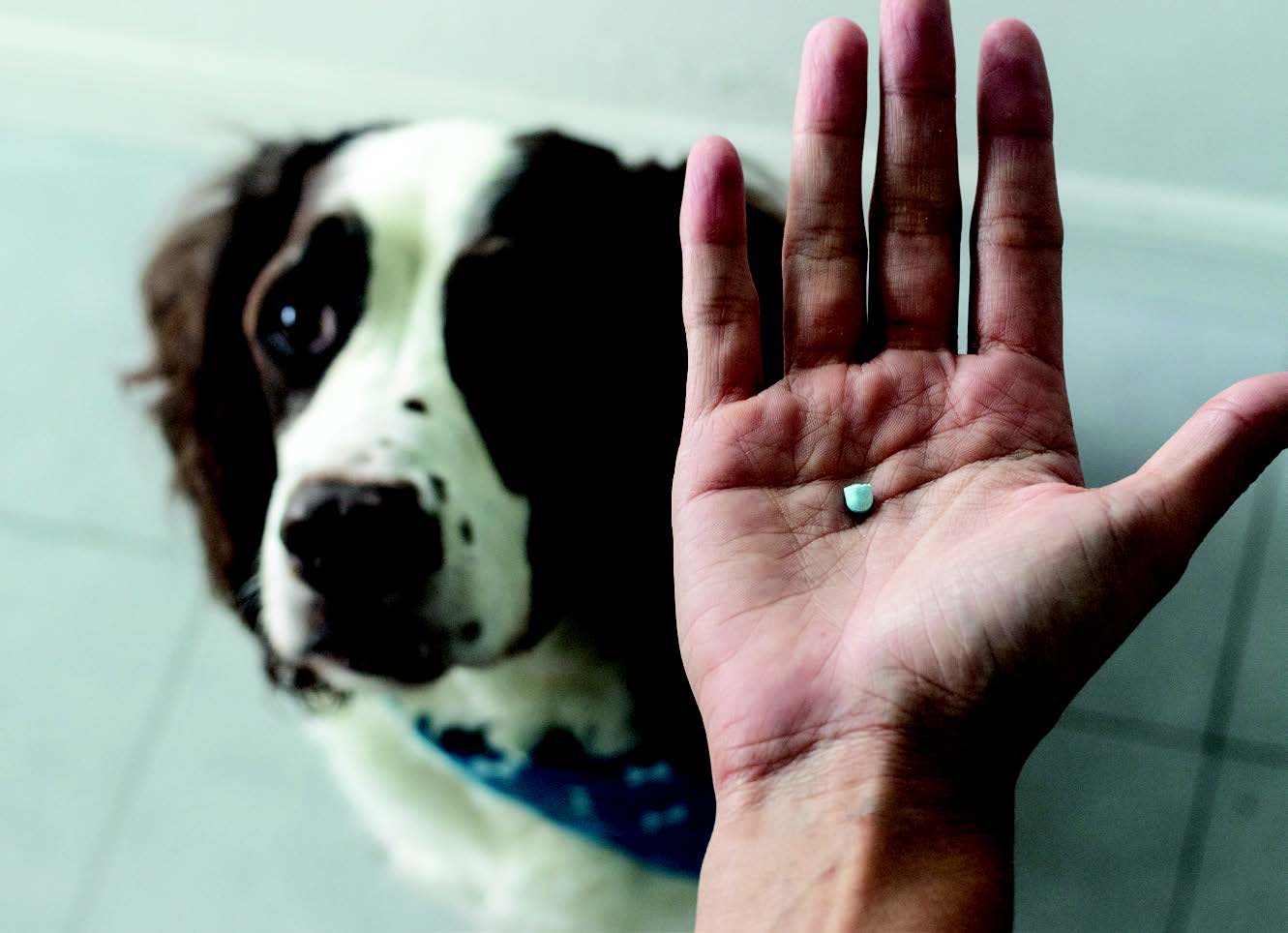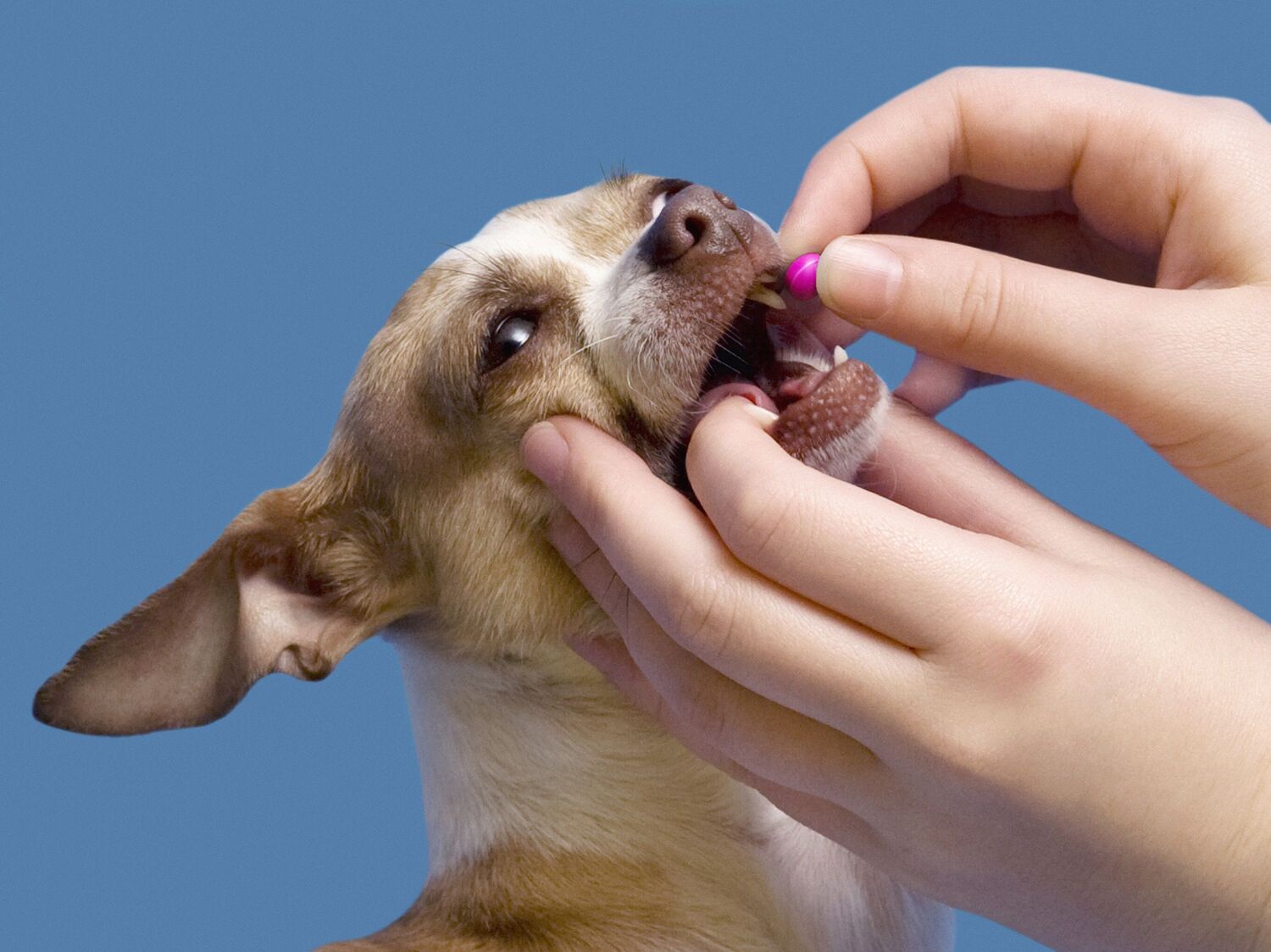Home>Health & Wellness>Common Health Issues>Heart Health>What Happens If You Give Your Dog Too Much Heartworm Medicine


Heart Health
What Happens If You Give Your Dog Too Much Heartworm Medicine
Published: February 7, 2024
Giving your dog too much heartworm medicine can have serious consequences for their heart health. Learn the risks and how to prevent overdosing.
(Many of the links in this article redirect to a specific reviewed product. Your purchase of these products through affiliate links helps to generate commission for Pawsomeoldies.com, at no extra cost. Learn more)
Table of Contents
Introduction
Heartworm disease is a serious and potentially fatal condition that can affect dogs. It is caused by parasitic worms that are transmitted through the bites of infected mosquitoes. To prevent this life-threatening disease, many dog owners rely on heartworm medicine, which is designed to kill the immature form of the heartworms and prevent them from developing into adults.
While heartworm medicine is an essential tool in protecting dogs from this dangerous disease, it's crucial for pet owners to understand the potential risks associated with its use. Giving your dog too much heartworm medicine can lead to adverse effects and even pose serious health risks. Therefore, it's important to be aware of the signs of heartworm medicine overdose and know what steps to take if an overdose is suspected.
In this article, we will delve into the intricacies of heartworm medicine, exploring its purpose, potential side effects of overdose, symptoms of overdose in dogs, and the necessary actions to take if an overdose is suspected. Additionally, we will provide valuable insights on how to prevent heartworm medicine overdose in dogs, empowering pet owners with the knowledge to safeguard their furry companions' well-being.
Understanding the implications of heartworm medicine overdose is crucial for every dog owner. By gaining a comprehensive understanding of this topic, you can ensure that your beloved canine companion receives the appropriate care and protection against heartworm disease, while minimizing the risk of potential complications associated with heartworm medicine administration.
Understanding Heartworm Medicine
Heartworm medicine, also known as preventives, is a crucial component of a dog's healthcare regimen, particularly in regions where heartworm disease is prevalent. These medications are designed to combat the spread of heartworm disease by targeting the immature larvae of the heartworms, known as microfilariae, and preventing them from maturing into adult worms. By impeding the development of these parasites, heartworm medicine effectively safeguards dogs from the potentially devastating effects of heartworm disease.
There are several types of heartworm preventives available, including oral medications, topical solutions, and injectable formulations. Each of these options offers unique benefits and may be recommended based on factors such as a dog's lifestyle, health status, and the prevalence of heartworm disease in their environment.
The primary function of heartworm medicine is to eliminate the microfilariae present in a dog's system, thereby interrupting the heartworm life cycle. This proactive approach not only protects the treated dog from the harmful effects of heartworm disease but also contributes to the broader effort of preventing the spread of heartworms within the canine population.
It's important to note that heartworm preventives are not a treatment for existing heartworm infections. Instead, they serve as a proactive measure to prevent new infections from taking hold. Therefore, it's crucial for dog owners to adhere to a regular preventive treatment schedule, as recommended by their veterinarian, to ensure continuous protection against heartworm disease.
Understanding the role and significance of heartworm medicine empowers dog owners to make informed decisions regarding their pet's healthcare. By working in tandem with veterinary professionals, pet owners can develop a comprehensive preventive care plan tailored to their dog's specific needs, thereby mitigating the risks associated with heartworm disease and promoting their furry companion's overall well-being.
Potential Side Effects of Heartworm Medicine Overdose
An overdose of heartworm medicine in dogs can lead to a range of potential side effects, some of which can be mild and transient, while others may pose more serious health risks. It's essential for dog owners to be aware of these potential side effects to recognize and address them promptly if an overdose occurs.
One of the primary concerns associated with heartworm medicine overdose is the risk of adverse reactions to the active ingredients in the medication. While these ingredients are formulated to effectively combat heartworm larvae, an excessive dosage can overwhelm a dog's system, leading to adverse reactions. Common side effects of heartworm medicine overdose may include gastrointestinal disturbances such as vomiting, diarrhea, and loss of appetite. Additionally, dogs may exhibit signs of lethargy, weakness, and disorientation following an overdose of heartworm preventive medication.
In more severe cases, an overdose of heartworm medicine can result in neurological symptoms, including tremors, seizures, and discoordination. These manifestations indicate a more critical situation and necessitate immediate veterinary attention. Furthermore, an overdose may also lead to allergic reactions in some dogs, presenting as itching, hives, facial swelling, and difficulty breathing. Allergic reactions require prompt intervention to prevent escalation and ensure the well-being of the affected dog.
It's important to recognize that the severity of the side effects resulting from a heartworm medicine overdose can vary depending on factors such as the specific medication involved, the dog's size, age, and overall health status. Therefore, it's crucial for dog owners to remain vigilant and observant of any unusual symptoms or behaviors exhibited by their pet following the administration of heartworm preventive medication.
By understanding the potential side effects of heartworm medicine overdose, dog owners can take proactive measures to prevent such incidents and respond effectively if an overdose occurs. This knowledge empowers pet owners to prioritize their dog's safety and well-being, ensuring that preventive medications are administered responsibly and in accordance with veterinary recommendations.
Symptoms of Heartworm Medicine Overdose in Dogs
Identifying the symptoms of heartworm medicine overdose in dogs is paramount for prompt intervention and mitigating potential health risks. While the manifestations of an overdose can vary depending on factors such as the specific medication involved and the dog's individual characteristics, there are several common symptoms that dog owners should be vigilant for.
One of the primary indicators of a potential heartworm medicine overdose is gastrointestinal distress. Dogs may exhibit symptoms such as vomiting, diarrhea, and loss of appetite following an excessive dosage of preventive medication. These signs of digestive upset serve as early warning signals and should prompt dog owners to closely monitor their pet's well-being.
In addition to gastrointestinal disturbances, an overdose of heartworm medicine can manifest in changes in a dog's behavior and physical condition. Lethargy, weakness, and disorientation are common symptoms observed in dogs that have been given too much heartworm preventive medication. These behavioral changes may indicate that the dog's system is reacting adversely to the excessive dosage, necessitating immediate attention and intervention.
Furthermore, neurological symptoms can also arise as a result of heartworm medicine overdose. Dogs may experience tremors, seizures, and discoordination, signaling a more critical situation that requires urgent veterinary assessment and care. These neurological manifestations are indicative of the potential impact of an overdose on a dog's central nervous system and should be addressed promptly to prevent further complications.
Allergic reactions are another concerning set of symptoms that can occur in dogs following a heartworm medicine overdose. These reactions may present as itching, hives, facial swelling, and difficulty breathing, indicating a severe adverse response to the medication. Allergic symptoms require immediate veterinary attention to mitigate the risk of escalation and ensure the affected dog's well-being.
It's important for dog owners to understand that the symptoms of heartworm medicine overdose can vary in severity and may be influenced by factors such as the specific medication involved, the dog's size, age, and overall health status. Therefore, maintaining a keen awareness of any unusual symptoms or behaviors exhibited by a dog following the administration of heartworm preventive medication is crucial for early detection and intervention in the event of an overdose.
By recognizing the symptoms of heartworm medicine overdose in dogs, pet owners can take proactive measures to safeguard their furry companions' well-being. This awareness empowers dog owners to respond effectively to potential overdose situations, ensuring that their pets receive timely care and intervention to mitigate the risks associated with excessive heartworm preventive medication.
What to Do If You Suspect Your Dog Has Been Given Too Much Heartworm Medicine
If you suspect that your dog has been given too much heartworm medicine, it is crucial to take immediate action to safeguard your pet's well-being. The following steps can guide you in addressing a potential overdose situation and ensuring the best possible outcome for your furry companion.
-
Cease Administration: If you suspect an overdose, discontinue the administration of any further heartworm preventive medication to your dog. This step is essential to prevent additional exposure to the excessive dosage and minimize the risk of further complications.
-
Contact Your Veterinarian: Promptly reach out to your veterinarian to seek professional guidance and assistance. Inform them of the situation, including the type of heartworm medicine administered, the potential dosage error, and any observable symptoms exhibited by your dog. Your veterinarian can provide tailored advice based on the specific circumstances and may recommend immediate action to address the overdose.
-
Observe and Document Symptoms: Monitor your dog closely for any signs of distress or adverse reactions. Document observed symptoms, including gastrointestinal disturbances, changes in behavior, neurological manifestations, or allergic reactions. This information will be valuable for your veterinarian in assessing the severity of the situation and determining the appropriate course of action.
-
Seek Veterinary Evaluation: Based on the guidance of your veterinarian, arrange for a thorough evaluation of your dog's health. Your veterinarian may recommend bringing your pet in for an examination to assess their condition, administer supportive care if necessary, and determine the most suitable treatment plan to address the overdose.
-
Follow Veterinary Recommendations: Adhere to the recommendations provided by your veterinarian regarding the management of the overdose. This may include administering specific treatments, monitoring your dog's vital signs, and implementing supportive measures to aid in their recovery. It is essential to follow your veterinarian's guidance diligently to optimize the chances of a positive outcome for your pet.
-
Prevent Recurrence: Take proactive measures to prevent future incidents of heartworm medicine overdose. This may involve reviewing and reinforcing proper medication administration techniques, ensuring accurate dosing based on your dog's weight and health status, and seeking guidance from your veterinarian to minimize the risk of dosage errors.
By taking swift and decisive action if you suspect your dog has been given too much heartworm medicine, you can mitigate the potential risks associated with an overdose and prioritize your pet's health and well-being. Collaboration with your veterinarian is paramount in addressing such situations, and their expertise and guidance are instrumental in navigating the challenges posed by a potential medication overdose.
Preventing Heartworm Medicine Overdose in Dogs
Preventing heartworm medicine overdose in dogs is a fundamental aspect of responsible pet ownership and proactive healthcare management. By implementing a series of preventive measures and adhering to best practices, dog owners can significantly reduce the risk of accidental overdosing and ensure the safe and effective administration of heartworm preventive medication to their furry companions.
One of the primary strategies for preventing heartworm medicine overdose is to maintain clear and accurate records of your dog's preventive treatment schedule. This includes documenting the type of medication administered, the dosage prescribed by the veterinarian, and the frequency of administration. By keeping meticulous records, dog owners can avoid confusion and minimize the likelihood of inadvertently administering excessive doses of heartworm preventive medication.
Furthermore, it is essential for dog owners to strictly adhere to the recommended dosage guidelines provided by their veterinarian. This involves carefully measuring the appropriate amount of medication based on the dog's weight and following the prescribed administration schedule. Avoiding guesswork and ensuring precise dosing according to the veterinarian's instructions are critical in preventing dosage errors and potential overdosing incidents.
Seeking regular veterinary consultations and guidance is another key component of preventing heartworm medicine overdose in dogs. By scheduling routine check-ups and discussions with the veterinarian, dog owners can stay informed about any updates or changes in heartworm preventive medications, ensuring that they are equipped with the latest information and recommendations for their pet's healthcare needs.
Education and awareness play a pivotal role in preventing heartworm medicine overdose. Dog owners should take the time to familiarize themselves with the specific characteristics of the preventive medication being used, including its active ingredients, potential side effects, and proper administration techniques. Understanding these crucial details empowers pet owners to administer the medication responsibly and recognize any warning signs of a potential overdose.
In households with multiple pets, it is essential to prevent accidental ingestion of another pet's medication. Keeping medications securely stored and out of reach of pets, as well as maintaining clear distinctions between different pets' medications, can help prevent mix-ups and inadvertent overdosing.
Lastly, open communication with the veterinary team is paramount in preventing heartworm medicine overdose. If there are any concerns or uncertainties regarding the administration of preventive medication, dog owners should promptly seek clarification and guidance from their veterinarian. Establishing a collaborative and communicative relationship with the veterinary professionals ensures that pet owners are equipped with the knowledge and support necessary to prevent medication-related mishaps.
By implementing these preventive measures and maintaining a vigilant approach to heartworm preventive medication administration, dog owners can effectively mitigate the risk of overdose and prioritize their pets' safety and well-being. Responsible medication management, informed decision-making, and proactive communication with veterinary professionals collectively contribute to a comprehensive strategy for preventing heartworm medicine overdose in dogs.
Conclusion
In conclusion, the administration of heartworm preventive medication is a critical aspect of safeguarding dogs against the potentially devastating effects of heartworm disease. However, the risk of accidental overdose underscores the importance of responsible medication management and vigilant pet care. Understanding the potential side effects and symptoms of heartworm medicine overdose empowers dog owners to recognize and address such situations promptly, thereby prioritizing their pets' well-being.
By maintaining clear records of preventive treatment schedules, adhering to prescribed dosage guidelines, and seeking regular veterinary guidance, dog owners can significantly reduce the risk of accidental overdosing. Additionally, fostering open communication with veterinary professionals and staying informed about the characteristics of the preventive medication being used are essential components of preventing medication-related mishaps.
In the event of a suspected overdose, swift action, including discontinuing further medication administration and seeking veterinary assistance, is crucial for mitigating potential health risks. Collaboration with veterinarians and diligent adherence to their recommendations are instrumental in navigating overdose situations and ensuring the best possible outcome for affected dogs.
Ultimately, preventing heartworm medicine overdose in dogs requires a proactive and informed approach, underpinned by responsible pet ownership and a commitment to prioritizing the health and well-being of canine companions. By implementing preventive measures and maintaining a vigilant stance toward medication administration, dog owners can effectively minimize the risk of overdose and contribute to the overall health and longevity of their beloved pets.














